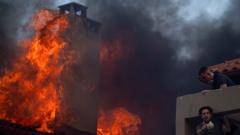Greece's firefighters remain engaged in a relentless battle against major wildfires fueled by an ongoing heatwave that saw temperatures soar to 42.4C (108.32F). Despite the current struggles, they have managed to contain many outbreaks, focusing their efforts on five major fire fronts located in the Peloponnese region, along with the islands of Evia, Kythira, and Crete. Neighboring Turkey, meanwhile, has reported its highest temperature ever, reaching a staggering 50.5C in Silopi. The blazes threaten numerous regions and look set to rage on for several more days, according to Turkey's Forestry Minister Ibrahim Yumakli.
Alarming reports indicate that firefighting teams are stretched thin as they combat the fires. In Turkey’s Karabuk province, a particularly fierce fire has persisted for four days, resulting in the tragic deaths of ten individuals who lost their lives in the line of duty. Local authorities in certain areas have implemented water usage restrictions to conserve resources, especially in popular tourist regions like Cesme.
In Greece, strong winds add to the fire hazards, complicating the containment efforts. The Greek government has officially requested support from the EU Civil Protection Mechanism to deploy six firefighting aircraft to assist ground crews battling the flames. Vasilios Vathrakoyannis, a spokesman for the fire brigade, confirmed that there was slight improvement after a night of intensive effort to battle the wildfires.
The devastation has already led to casualties among firefighters, injuries, significant loss of life, destruction of properties, and extensive damage to forested areas. Kythira faces an urgent crisis with estimates suggesting about 20% of the island has suffered from the ongoing fire ignited in the village of Pitsinades. Evacuation alerts have been issued for residents in several villages.
On Evia, officials reported an uncontrolled fire near Pissona, which prompted evacuations as six firefighters were hospitalized due to burns and smoke inhalation, leaving several villages in darkness. In Messinia, another wildfire has caused severe damage to homes and agricultural land, raising critical concerns over food security and community livelihood.
As wildfires threaten communities across Greece and Turkey, the precarious interplay of climate change, forest management, and community preparedness become increasingly crucial. The fires are symptomatic of a broader environmental crisis, underscoring the urgency for effective policies to combat climate change and preserve the natural landscape that supports both local economies and indigenous practices. The international community’s attention is drawn to these events, calling for solidarity in the face of escalating environmental disasters.
















